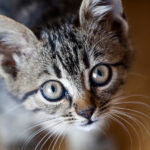Often mistaken for a miniature werewolf, the Lykoi cat, affectionately nicknamed the “wolf cat,” is a breed that captivates with its wild appearance and engaging personality. If you’re fortunate enough to encounter one of these rare felines, you’ll quickly realize they are far more than just a striking look. Lycan Cats are active, intelligent companions who thrive on interaction and exploration, bringing a unique blend of wild charm and domestic affection into your home.
Standing at a petite 8–10 inches tall and weighing between 6–12 pounds, the Lycan cat is similar in size to many other domestic cat breeds. However, their sparse coat and distinctive roan pattern set them apart, immediately drawing comparisons to their mythical namesake.
Caring for Your Lycan Cat: Embracing the Unique
The Lycan cat’s distinctive appearance is a result of a natural genetic mutation leading to them being partially hairless. This unique trait gives them a roan coat – a beautiful mix of colored and white hairs across their body, while their face, legs, and tail typically display more solid coloring. Despite their seemingly coarse fur, Lycan cats are surprisingly soft to the touch, thanks to the absence of a dense undercoat and hair growing in patches.
Veterinarians, like Dr. Antonio DeMarco DVM, chief medical officer at GoodVets, who has encountered only a handful of Lykoi in 15 years of practice, attribute their partial hairlessness to hypotrichosis, a genetic condition. This condition results in Lycan cats having fewer hair follicles per hair follicle group compared to typical domestic cats, leading to noticeably thinner hair.
Similar to Sphynx cats, Lycan cats benefit from a high-quality diet to maintain healthy skin and may require occasional baths to manage oil buildup. While they might shed less than some breeds during most of the year, be prepared for a dramatic molt. Lycan cats are known to “wolf out,” a term of endearment describing their periodic shedding, which can sometimes leave them almost entirely bald.
Lycan Cat Health: Robust Breed with Specific Needs
The Lykoi cat breed is relatively new, officially established in 2011 by veterinarian Johnny Gobble. From the outset, Gobble prioritized the health of the breed, meticulously testing founding kittens for various infectious diseases and disorders, including comprehensive cardiac examinations. Collaborating with geneticists at the University of California, Davis, and dermatologists at the University of Tennessee, he aimed to rule out any inherent breed-specific health issues.
Thanks to these responsible breeding practices, Lycan cats are generally considered a healthy breed with a commendable average lifespan of 12–15 years. However, their unique coat does predispose them to certain conditions, and like all domestic cats, they can still be susceptible to common feline ailments. Therefore, considering pet insurance for your Lycan kitten might be a prudent step to ensure their long-term well-being.
Lymphocytic Mural Folliculitis: A Skin Condition to Watch For
Research from the University of Missouri has identified lymphocytic mural folliculitis as a condition associated with the reduced number of hair follicles in Lykoi cats. This condition is often linked to allergic reactions in cats with normal coats.
Cats affected by lymphocytic mural folliculitis can exhibit scaly, crusty skin, particularly on their head, neck, and abdomen. Other symptoms may include sores around the lips and eyelids, and dry, cracked paw pads. If you observe these or any other unusual skin changes in your Lycan cat, prompt veterinary consultation is crucial to determine the underlying cause and appropriate treatment.
Dental Disease: A Common Feline Concern
Dental disease poses a significant risk to all cat breeds, including Lykoi cats. It can lead to a range of problems, from bad breath and oral pain to tooth loss and systemic health issues. Preventive measures are key to maintaining your Lycan cat’s dental health. Regular tooth brushing and routine veterinary dental checkups are highly recommended to minimize the risk of dental disease and ensure a healthy, pain-free mouth for your feline companion.
Nutritional Needs of a Lycan Cat: Fueling the Wolf Within
Lycan cats, whether kittens or adults, require cat food that adheres to the nutritional guidelines established by the Association of American Feed Control Officials (AAFCO) for their respective life stages. Lykoi kittens should be fed a diet specifically formulated for kittens to support their growth and development. Around the age of one year, they should transition to adult cat food.
Feeding Guidelines for Lykoi Cats
Lykoi kittens can thrive on either free-feeding, where food is available throughout the day, or scheduled meals provided multiple times daily. Adult Lycan cats, on the other hand, benefit from structured feeding, typically involving smaller meals given twice a day or more.
If your Lycan cat tends to eat too quickly, or if you wish to enhance their mealtime experience through enrichment, consider employing food puzzles, lick mats, or slow feeders. These tools can help regulate their eating pace and provide mental stimulation during meals.
Portion Control: Maintaining a Healthy Weight
Kittens require ample nutrition to support their rapid growth, necessitating multiple daily meals of high-quality kitten food. Adult cats, however, are prone to weight gain and obesity if their calorie intake isn’t carefully managed.
Consult your veterinarian to determine your adult Lycan cat’s ideal weight, considering their lifestyle and any pre-existing health conditions. Your vet can provide personalized recommendations on the appropriate daily calorie intake to maintain a healthy weight and body condition for your Lykoi.
Nutritional Supplements: When Are They Needed?
Generally, as long as your Lycan cat consumes a complete and balanced cat or kitten food, nutritional supplements are not necessary.
However, in certain cases, your veterinarian might recommend a diet enriched with omega-3 and -6 fatty acids. These beneficial fats can contribute to improved skin health, which is particularly relevant for Lykoi cats with their sparse coats. Additionally, your vet may prescribe specific supplements to address any other health concerns your Lykoi may develop.
Lycan Cat Behavior and Training: Engaging the Wild Instincts
Personality and Temperament: Affectionate Hunters
Lycan cats are known for their friendly and affectionate nature, forming strong bonds with their human families. However, don’t be surprised if your Lykoi exhibits stalking and pouncing behaviors; it’s a testament to their strong prey drive, a trait inherited from their feral cat ancestry. While they are wonderful house pets, their inherent hunting instincts might make them less suitable companions for very small or timid pets.
Typical Lykoi Behavior: Active and Curious
While Lykoi cats appreciate a warm lap, especially on cooler days due to their thinner coat, they are generally more inclined to be active and engaged. These intelligent and high-energy felines are always seeking new activities, whether it’s playfully interacting with houseplants or stealthily pursuing their favorite toy.
Training Potential: Smart and Trainable
Lykoi cats are intelligent and enjoy learning new tricks, making training a rewarding experience.
However, due to their strong prey drive and sensitive skin, leash and harness training might not be ideal for Lykois. A safe and shaded catio provides a fantastic alternative for outdoor enrichment. Indoors, positive reinforcement techniques using treats, toys, and praise can be highly effective in teaching your Lykoi tricks like fist bumps and recall.
Fun Activities to Keep Your Lykoi Engaged:
- Enjoying the view from a high cat tower or shelf
- Exploring every nook and cranny of their environment
- Engaging in stalking games with toys or even family members
- Interactive play sessions with wand toys
- Fetching toys like a canine companion
- Tackling food puzzles for mental stimulation
- Cozying up under bed covers for warmth
- Basking in sunlight (with appropriate sun protection)
- Relaxing in their favorite cat bed
Lykoi Grooming: Maintaining the Werewolf Look
Despite their sparse coat, Lykoi cats are not low-maintenance when it comes to grooming. They require regular brushing, similar to most other cat breeds, and their skin needs consistent attention to stay healthy.
Skin Care: Keeping it Clean and Protected
To maintain their distinctive wolf-like appearance, Lykoi cats benefit from occasional baths to prevent oil and dirt buildup on their exposed skin. Use a gentle, cat-specific shampoo, avoiding harsh scents or drying agents. However, avoid over-bathing, as it can lead to skin dryness and irritation.
Lykoi cats are susceptible to sunburn due to their thin coat. It’s best to keep them indoors or in shaded outdoor areas like catios. If outdoor exposure is unavoidable, consider UV-protective clothing or pet-safe sunscreen. UV-blocking window film can also provide added protection indoors, especially for cats who enjoy sunbathing in window perches.
Coat Care: Managing Shedding and Molting
Lykoi cats do shed, despite their thin coat, and are known to molt, or “wolf out.” The extent of shedding and molting varies between individuals. Some Lykois may lose almost all their fur, while others experience minimal shedding.
Regular brushing a few times a week helps manage shedding and molting, reducing hairballs, matting, and loose fur around your home.
Eye and Ear Care: Routine Checks
While Lykoi eyes don’t require special care, monitor for any changes like excessive or colored discharge, which could indicate an infection requiring veterinary attention.
Similarly, check their ears regularly for dirt or wax buildup, and gently clean them as needed, given the minimal fur around their ears which offers less natural protection.
Considerations for Lycan Cat Owners: Is This Breed Right for You?
The ideal home for a Lycan cat is one that appreciates an active, curious, and adventurous companion. They thrive in environments where their intelligence and energy are engaged through play and interaction. Prospective owners should be prepared for their unique grooming needs, including occasional baths and awareness of their skin’s sun sensitivity. It’s also important to be aware of their molting patterns, and not be alarmed if your Lykoi experiences significant coat changes.
While their friendly nature makes them suitable for many households, families with very young children or small, timid pets should be mindful of the Lykoi’s strong prey drive and ensure appropriate supervision and introductions. Daily playtime and mental stimulation are essential to keep these intelligent and inquisitive felines happy and well-adjusted.
Lykoi FAQs: Addressing Common Questions
Why are Lykoi cats called “wolf cats” or “werewolf cats?”
The name “Lykoi” originates from the Greek word for wolf, “lycos,” perfectly capturing their unique appearance. Their sparse, roan coat, patchy fur growth, and lack of undercoat create a striking resemblance to a miniature werewolf. The breed’s characteristic molting, humorously termed “wolfing out,” further reinforces this connection to their wolfish nickname.
Are Lykoi cats high-maintenance?
Lykoi cats require specific attention to their coat and skin, making them moderately demanding in terms of care. While they may not have a dense coat, regular brushing is still necessary to manage shedding and prevent matting. Their skin needs regular monitoring for dryness, irritation, and sunburn, requiring proactive care and protection.
How much does a Lykoi cat cost?
The price of a Lykoi cat typically starts around $1,000.
Featured Image: iStock/Angela Emanuelsson
WRITTEN BY
Janelle Leeson
Freelance Writer


